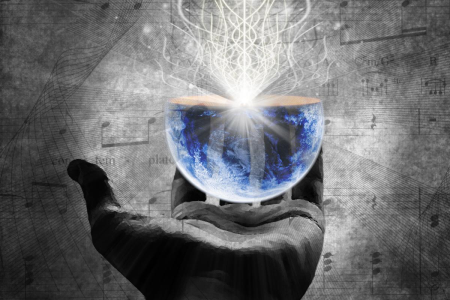People began calling Kabbalist Yehuda Ashlag “Baal HaSulam” after he wrote the Sulam Commentary on The Book of Zohar. He also wrote four introductions to the Sulam commentary. These are the “Introduction to the Book of Zohar,” “Preface to the Book of Zohar,” “Preface to the Sulam Commentary” and “Preface to the Wisdom of Kabbalah” (also known as “Pticha”). In general, we can say that they are completely separate compositions rather than introductions to The Book of Zohar with the Sulam Commentary.
In the “Introduction to the Book of Zohar,” Baal HaSulam raises questions and then answers them.
- What is our essence?
- What is our activity in the process that happens to us, in which we participate without understanding what our participation is, and generally,
- Where are we going, where is life leading us?
When we look at ourselves, we find that we are very small. When we look at the entire world around us, even our world and our universe, we feel insignificant. But on the other hand, our world is like a grain of sand compared to the immense spiritual worlds. It is said that the human being is the greatest being, above and beyond all of these worlds, able to devour all of these worlds and expand above all of them. How can this be, if the person is so small?
Here, Baal HaSulam explains that it is our spiritual attributes that are important rather than our physical attributes. With regard to our physical attributes, of course we cannot compare ourselves to all the huge masses of billions and tons of rock that exist in the universe, or with infinite time. But when we compare ourselves in a different plane or dimension, namely in regard to spiritual forces, then naturally we are the biggest and greatest in this world. Then we really encompass everything in ourselves, the still, vegetative, animal and speaking nature inside of us and accordingly, we ascend above it all.
In principle, this process is the process of self-attainment. The person discovers everything around him through himself, by attaining himself. Why? (We will examine this in subsequent articles of Baal HaSulam.) Because by attaining himself, the person attains the entire surrounding world. This is because the whole surrounding world is nothing more than a reflection of our inner states.
Nothing exists around us. It is our inner attributes that are being projected this way on the hind side of our head, for instance, resulting in the picture of the surrounding world that we see.
In reality this surrounding world does not exist. There is nothing around me, you are not in front of me, these walls are not here, and this world is absolutely not here. All of this is how the structure in the World of Infinity is being depicted for me in my attributes.
However, I am not in the World of Infinity with my attributes, and I thus perceive the structure of the World of Infinity, where everything is connected together in one Kli (vessel/receptacle/tool) under one Light (quality of love and bestowal), on the level of our world where this whole structure of the World of Infinity appears before me and seems to me as this world. However, this conception is purely my personal one, inner and subjective.
This is why Baal HaSulam discusses the topic of perception of reality in this article. Even more so than in “Introduction to the Book of Zohar,” Baal HaSulam discusses the topic of perception of reality in more detail in his article “Preface to the Book of Zohar.”
In general, the section of Kabbalah that examines our self-attainment and our attainment of others around us can be considered its most interesting section. The attainment of the world is called “perception of reality.” It is because in principle, it determines our states and how we can change them to the level where everything is revealed to us and there are no illusions of me, you, and everything else, but rather everything merges as one common Kli (vessel/receptacle/tool) filled by the Upper Force, the Creator (the quality of love and bestowal).
The Free Kabbalah Course is based on the articles of Baal HaSulam and provides step-by-step guided learning from experienced Kabbalah instructors of Kabbalah’s basic concepts based in Baal HaSulam’s articles. Baal HaSulam was the first Kabbalist in history who wrote articles not only for Kabbalists, but for the broad public, in order to explain Kabbalah’s fundamentals, because he understood the need that would emerge in humanity to answer deeper questions about life’s meaning and purpose. Therefore, if you’re interested in such topics, we recommend taking the free course and start learning about the world around you and inside you anew. Click the banner below to sign up for the free course …

